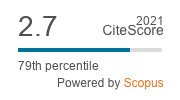Stability of an unemployment model with a non-linear job creation
Keywords:
Unemployment model, Global asymptotic stability, Geometric approach, Nonlinear dynamicsAbstract
This study introduces a mathematical model for unemployment that incorporates nonlinear functions in the matching process and job creation. Derived from observed data and constraints on job creation, the nonlinearity enhances the model’s realism. Through a geometric approach, sufficient conditions are identified to ensure a successful application of global stability analysis. The dynamics of the general system, including thresholds and global stability of the nontrivial equilibrium, are fully determined. Existence and stability of both trivial and non-trivial equilibria are rigorously proven using Lyapunov functions, Jacobian matrices, and the Lozinski measure. Numerical analysis illustrates the theoretical findings, emphasizing the global asymptotic stability of the nontrivial equilibrium under specific conditions. This work offers valuable insights into unemployment dynamics, bridging complex mathematics with practical economic models.
References
R. Al-Maalwi, S. Al-Sheikh, H. Ashi, and S. Asiri, “Mathematical modeling and parameter estimation of unemployment with the impact of training programs,” Mathematics and Computers in Simulation, vol. 182, pp. 705–720, 2021.
R. M. Al-Maalwi, H. A. Ashi, and S. Al-sheikh, “Unemployment model,” Applied Mathematical Sciences, vol. 12,
pp. 989–1006, 2018.
S. E. Fadily and A. Kaddar, “A delayed model of unemployment with a general nonlinear recruitment rate,” Journal
of Mathematical and Computational Science, vol. 12, 2022.
S. Al-Sheikh, R. Al-Maalwi, and H. A. Ashi, “A mathematical model of unemployment with the effect of limited jobs,”
Comptes Rendus Math-ématique, vol. 359, no. 3, pp. 283–290, 2021.
S. E. Fadily and A. Kaddar, “Global asymptotic stability of an unemployment model using geometric approach,”
Results in Nonlinear Analysis, vol. 6, no. 2, pp. 159–171, 2023.
C. A. Pissarides, Equilibrium Unemployment Theory. MIT Press, 2000.
D. T. Mortensen and C. A. Pissarides, “Job creation and job destruction in the theory of unemployment,” The Review
of Economic Studies, vol. 61, no. 3, pp. 397–415, 1994.
O. Blanchard and L. Summers, “Hysteresis and the european unemployment problem,” tech. rep., National Bureau of
Economic Research, Inc, 1986.
G. Faggio and S. Nickell, “Patterns of work across the oecd*,” The Economic Journal, vol. 117, no. 521, pp. F416–F440,
A. Bassanini and R. Duval, “Employment patterns in oecd countries: Reassessing the role of policies and institutions,”
tech. rep., OECD Economics Department Working Papers, 2006.
O. J. Blanchard, P. Diamond, R. E. Hall, and J. Yellen, “The beveridge curve,” Brookings Papers on Economic Activity,
vol. 1989, p. 1, 1989.
D. H. Autor, L. F. Katz, M. S. Kearney, E. Berman, and A. Chandra, “The polarization of the u.s. labor market,”
American Economic Review, vol. 96, pp. 189–194, 5 2006.
G. Naldi, L. Pareschi, and G. Toscani, Mathematical Modeling of Collective Behavior in Socio-Economic and Life
Sciences. Birkhäuser, 2010.
M. Y. Li and L. C. Wang, “A criterion for stability of matrices,” Journal of Mathematical Analysis and Applications,
vol. 225, no. 1, pp. 249–264, 1998.
C. W. A, Stability and Asymptotic Behavior of Differential Equations. Heath Boston, 1965.
HCP, “Activité, emploi et chômage, résultats annuels 2022,” tech. rep., High Commission for Planning, Kingdom of
Morocco, Rabat, Morocco, 2022.
R. M. Solow, “A contribution to the theory of economic growth,” The Quarterly Journal of Economics, vol. 70, no. 1,
pp. 65–94, 1956.
Downloads
Published
How to Cite
Issue
Section
License
Copyright (c) 2024 Results in Nonlinear Analysis

This work is licensed under a Creative Commons Attribution 4.0 International License.



